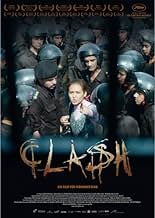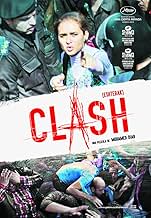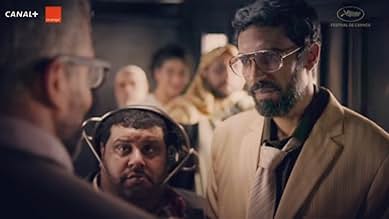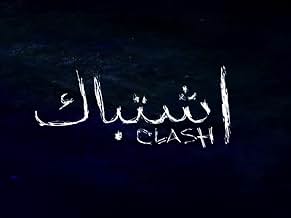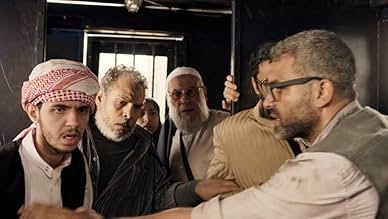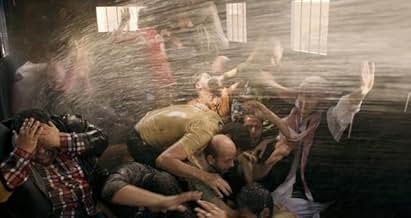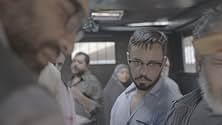IMDb-BEWERTUNG
7,4/10
6381
IHRE BEWERTUNG
In einem 8 Quadratmeter großen Polizeilaster kommen Menschen unterschiedlichen sozialen und politischen Hintergrunds während der Tumulte nach der Absetzung von Präsident Mursi als Festgenomm... Alles lesenIn einem 8 Quadratmeter großen Polizeilaster kommen Menschen unterschiedlichen sozialen und politischen Hintergrunds während der Tumulte nach der Absetzung von Präsident Mursi als Festgenommene zusammen.In einem 8 Quadratmeter großen Polizeilaster kommen Menschen unterschiedlichen sozialen und politischen Hintergrunds während der Tumulte nach der Absetzung von Präsident Mursi als Festgenommene zusammen.
- Auszeichnungen
- 13 Gewinne & 9 Nominierungen insgesamt
Muhammad El-Sebai
- Zain
- (as Mohamed El Sebaey)
Mohamed Elsewisy
- Uwais
- (as Mohamed El Souisy)
Ahmad Abdulhamid Hifni
- Awadh
- (as Ahmed Abdel Hamid)
Husni Sheta
- Fishoo
- (as Hosny Sheta)
Dash Ahmed
- Fares
- (as Ahmad Dash)
Gamil Barsoom
- Salah
- (as Gameel Barsoum)
Muhammad Tareq
- Hussein
- (as Mohamed Tarek)
Muhammad Gamal Qalbaz
- Tamer
- (as Mohamed Gamal Kalbaz)
Empfohlene Bewertungen
Describes the Arab Spring in Egypt. The film is shot in a single venue and tells the story of a day from the past civil war.A person who knows the geography of the Middle East and the history of Egypt will be different from those who do not know the messages they will receive from this film. People from the same root do not know what they get by breaking apart and killing each other. Are lessons learned from these and similar massacres? The answer to this question is very uncertain.
The movie has a clear message. Civil wars are unnecessary and people of the same nationality should not come to such games. One of the most powerful movies I've been watching lately. This film contains beautiful messages and is extremely realistic. You should give this movie a chance.
The movie has a clear message. Civil wars are unnecessary and people of the same nationality should not come to such games. One of the most powerful movies I've been watching lately. This film contains beautiful messages and is extremely realistic. You should give this movie a chance.
After almost three decades of dictatorial reign, when the government of President Hosni Mubarak was overthrown by the events following Tahrir Square in 2011, popular elections brought Mohammed Morsi of the Muslim Brotherhood to power in Egypt. However, his radical religious agenda drove a deep wedge in a multi-ethnic society and after a popular, violent uprising by his opponents in 2013, the army took control. This pushed the country on the brink of civil war. Egypt became a chaotic crucible and was enveloped in a season of daily protests on the streets between supporters of Muslim Brotherhood who felt that their democratically elected government was unfairly unseated and supporters of the army who sought an end to the fundamentalist regime of the Muslim Brotherhood.
The film captures one such day when protests break out in various parts of Cairo between these opposing factions. The entire movie is set and has been filmed within the confines of a police van which has been deployed on the street. While it starts with the arrest of an Egyptian born journalist working with the Associated Press covering the clashes along with his local freelance cameraman, the van is quickly filled up with a motley assembly of people cutting across the spectrum of age, economic status and owing their allegiance to either side of the ideological divide. Tempers fray with the supporters of Muslim Brotherhood and the pro-army group find themselves at each other's throats and find that their strength of ideological conviction is put to a litmus test by this sticky situation. As the cops try to shepherd the police van to safety traversing through treacherous streets of midtown Cairo filled with rioting mobs, the van - literally as well as figuratively - becomes a simmering cauldron ready to explode.
Read a full review @ - http://bit.ly/2jz1nUH
The film captures one such day when protests break out in various parts of Cairo between these opposing factions. The entire movie is set and has been filmed within the confines of a police van which has been deployed on the street. While it starts with the arrest of an Egyptian born journalist working with the Associated Press covering the clashes along with his local freelance cameraman, the van is quickly filled up with a motley assembly of people cutting across the spectrum of age, economic status and owing their allegiance to either side of the ideological divide. Tempers fray with the supporters of Muslim Brotherhood and the pro-army group find themselves at each other's throats and find that their strength of ideological conviction is put to a litmus test by this sticky situation. As the cops try to shepherd the police van to safety traversing through treacherous streets of midtown Cairo filled with rioting mobs, the van - literally as well as figuratively - becomes a simmering cauldron ready to explode.
Read a full review @ - http://bit.ly/2jz1nUH
After the screening in the London Film Festival, when the director and producer came on stage to speak with the audience (overwhelmingly from the Middle East), more than one person complained to them that the movie had too much humour in it while there was nothing amusing about Egypt's regime and the tragic events that came on the heels of its botched popular revolt. Clash is shot from within the interior of a police van. Inside a group of people - women and men, Islamists and secularists, young and old - are being moved around Cairo. They have all been arbitrarily and violently detained by the security forces during pro- and anti- regime demonstrations taking place on this day, and they are moved around simply because the prisons are already too full. The interactions among the people inside the van and their interactions with the security personnel and others outside it engulf the viewers with claustrophobia, anger, fear, horror, despair, and glimmers of hope that are quickly dispelled. And yes, as the Director explained, there are funny moments, simply because Egyptians are humorous. It is a bold and daring film, exposing all those who took part in it to the risks of the regime's displeasure. It has been approved for screening by the Egyptian censor, but not without some interventions that the director and producer preferred not to recall. All in all, a superb mirror of the suffocating air in present day Egypt.
Seen at the Filmfest Ghent 2016 (website: http://www.filmfestival.be/en). Prior to the screening, the director told that he succeeded in pissing off everyone in Egypt by making this movie. Arousing that much controversy can be considered a huge success in itself, were it not that he suffered some trauma because of everyone punching him afterwards. Along the line, he was accused of being a spy, funded by the West, even though the film is against no one, just pro humanity in general. Even so remarkable is that the film got attacked by everyone equally, because it inadvertently seemed to humanize "the others".
After Lebanon (2009, Samuel Maoz) this movie extends the concept of the narrow space with a very limited view on the outside world, and no easy way to escape due to a hostile environment. New is that the 25 persons locked up in a police van, are very different from each other with respect to age, religion, politics, and even sexes are mixed with all complications thereof. In other words, the hostility is not only the outside world but comes from fellow prisoners too, maybe even more so from internal rather than external.
For me it was not easy to remember faces and names; I lost track of each one's political stance very soon. Nevertheless, the hodgepodge of people and attitudes is clear from the outset. There is spurious contact with other police vans, containing people in a similar position, with name exchanges to verify whether relatives or friends are kept there and hopefully are in good health. Also, there are frequent contacts with soldiers, sometimes helpful sometimes not so helpful due to orders from higher echelons, or flatly unhelpful because of uncertainty about the other side's intentions.
The Q&A with the director after the screening brought a lot of useful information, in fact an addendum to his initial address before the screening. I scribbled down the following notes. It is difficult to make a movie like this in contemporary Egypt. A self-contained movie could be made about the making of this one, or even around making movies in general in Egypt for that matter. And it can still be worse, when seeing the film being pulled off cinema listings after its official release. On the other hand, he received moral support from outside Egypt, like for example Tom Hanks, who wrote that this movie changed his view on Egypt. Following up on a question from the audience, about being still welcome in Egypt, the director replied that it is complicated. In any case, it is still unclear whether he could make any other film there. It is not that that some person or some bureaucracy is against, because of Egypt being so many things together and certainly no homogeneous mass. Another question from the audience about the humor that was prominently present, despite the subject matter being a very serious matter. The director replied that the humor was interwoven to breathe, something that is very common in Egypt, often observed even during funerals.
After Lebanon (2009, Samuel Maoz) this movie extends the concept of the narrow space with a very limited view on the outside world, and no easy way to escape due to a hostile environment. New is that the 25 persons locked up in a police van, are very different from each other with respect to age, religion, politics, and even sexes are mixed with all complications thereof. In other words, the hostility is not only the outside world but comes from fellow prisoners too, maybe even more so from internal rather than external.
For me it was not easy to remember faces and names; I lost track of each one's political stance very soon. Nevertheless, the hodgepodge of people and attitudes is clear from the outset. There is spurious contact with other police vans, containing people in a similar position, with name exchanges to verify whether relatives or friends are kept there and hopefully are in good health. Also, there are frequent contacts with soldiers, sometimes helpful sometimes not so helpful due to orders from higher echelons, or flatly unhelpful because of uncertainty about the other side's intentions.
The Q&A with the director after the screening brought a lot of useful information, in fact an addendum to his initial address before the screening. I scribbled down the following notes. It is difficult to make a movie like this in contemporary Egypt. A self-contained movie could be made about the making of this one, or even around making movies in general in Egypt for that matter. And it can still be worse, when seeing the film being pulled off cinema listings after its official release. On the other hand, he received moral support from outside Egypt, like for example Tom Hanks, who wrote that this movie changed his view on Egypt. Following up on a question from the audience, about being still welcome in Egypt, the director replied that it is complicated. In any case, it is still unclear whether he could make any other film there. It is not that that some person or some bureaucracy is against, because of Egypt being so many things together and certainly no homogeneous mass. Another question from the audience about the humor that was prominently present, despite the subject matter being a very serious matter. The director replied that the humor was interwoven to breathe, something that is very common in Egypt, often observed even during funerals.
The idea of a film set entirely within a police truck in Cairo does not seem a particularly enticing prospect. Writer, director Mohamed Diab manages, however, to make this both riveting and exciting. With the considerable mix of Egyptians packed together and the troubles raging on the streets outside, this is an incredibly potent mix of actions, emotions and life changing moments. Clearly, the van load of Muslim Brotherhood supporters, Christians, police and their supporters brings all into conflict but also provides the opportunity to consider compromise and the possibility of swapping conflict for reconciliation. At the same time this is a thunderingly exciting film with provocative and believable dialogue and wincingly, in your face action. Interrupted momentarily whilst watching, I returned to my seat to become aware of just how fast my heart was racing. Stunning filmmaking and easily enjoyed without considering the political dimensions but even more potent in doing so.
Wusstest du schon
- WissenswertesDirector Mohamed Diab received a message from actor Tom Hanks thanking him for the movie. Hanks said that the film should change the way the West looks at democracy and politics in the Middle East.
- VerbindungenReferenced in Gemeinsam unbesiegbar: The Making of Moon Knight (2022)
Top-Auswahl
Melde dich zum Bewerten an und greife auf die Watchlist für personalisierte Empfehlungen zu.
- How long is Clash?Powered by Alexa
Details
- Erscheinungsdatum
- Herkunftsländer
- Sprachen
- Auch bekannt als
- Протистояння
- Drehorte
- Produktionsfirmen
- Weitere beteiligte Unternehmen bei IMDbPro anzeigen
Box Office
- Bruttoertrag in den USA und Kanada
- 18.215 $
- Weltweiter Bruttoertrag
- 143.121 $
- Laufzeit
- 1 Std. 37 Min.(97 min)
- Farbe
- Seitenverhältnis
- 1.85 : 1
Zu dieser Seite beitragen
Bearbeitung vorschlagen oder fehlenden Inhalt hinzufügen


